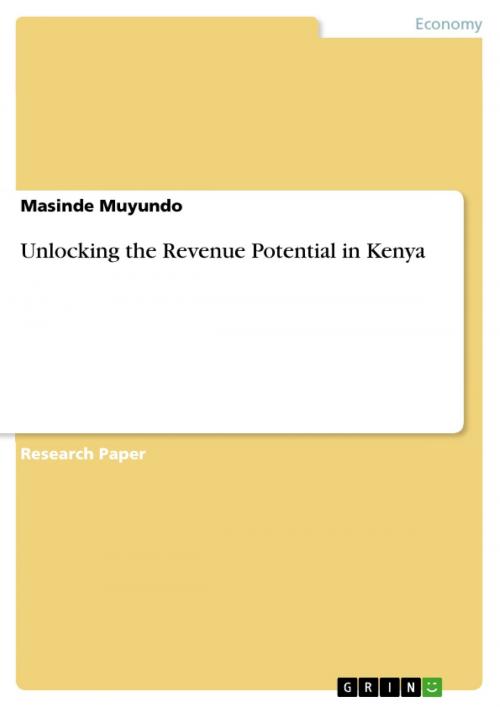| Author: | Masinde Muyundo | ISBN: | 9783656262350 |
| Publisher: | GRIN Verlag | Publication: | August 23, 2012 |
| Imprint: | GRIN Verlag | Language: | English |
| Author: | Masinde Muyundo |
| ISBN: | 9783656262350 |
| Publisher: | GRIN Verlag |
| Publication: | August 23, 2012 |
| Imprint: | GRIN Verlag |
| Language: | English |
Research Paper (postgraduate) from the year 2012 in the subject Economics - Macro-economics, general, , language: English, abstract: The new world order is one where the flow of external resources especially to emerging economies such as Kenya is shrinking. Indeed, the recent recession in developed countries was a wakeup call to many that the expected resources could one day dry up. This is happening when the need for support is increasing, hence, the need to become self sustainable and to increase the level of resources that can be raised domestically. Domestic resource mobilization (DRM) refers to the savings and investment generated by households, domestic firms, and government. The need for African countries to mobilize domestic resources as a medium-to long-term goal is now widely accepted. In the past, Africa has been rated poorly as relates to saving and investment. A sustained increase in growth rates require higher level of savings and investment, as well as increased investment productivity. Developing countries and those in transition are at present confronting unsustainable fiscal deficits; unabated debt service charges and declining external assistance, seriously affecting their development process. Domestic tax revenues are the most sustainable source of financing for public expenditures in developing countries. The experience with domestic resource mobilization of developing countries over the last 25 years has been mixed. In countries such as Botswana, Israel, Kuwait and Seychelles, the central government revenue's share in GDP has been more than 40 percent on average. The issue of tax compliance is extremely important both to those concerned with the key role increased tax yields can play in restoring macroeconomic balance and to those concerned with tax policy and its effects on the economy in general. However, the ability of developing countries' governments to raise direct tax revenues is constrained by a number of external and internal factors. [...]
Research Paper (postgraduate) from the year 2012 in the subject Economics - Macro-economics, general, , language: English, abstract: The new world order is one where the flow of external resources especially to emerging economies such as Kenya is shrinking. Indeed, the recent recession in developed countries was a wakeup call to many that the expected resources could one day dry up. This is happening when the need for support is increasing, hence, the need to become self sustainable and to increase the level of resources that can be raised domestically. Domestic resource mobilization (DRM) refers to the savings and investment generated by households, domestic firms, and government. The need for African countries to mobilize domestic resources as a medium-to long-term goal is now widely accepted. In the past, Africa has been rated poorly as relates to saving and investment. A sustained increase in growth rates require higher level of savings and investment, as well as increased investment productivity. Developing countries and those in transition are at present confronting unsustainable fiscal deficits; unabated debt service charges and declining external assistance, seriously affecting their development process. Domestic tax revenues are the most sustainable source of financing for public expenditures in developing countries. The experience with domestic resource mobilization of developing countries over the last 25 years has been mixed. In countries such as Botswana, Israel, Kuwait and Seychelles, the central government revenue's share in GDP has been more than 40 percent on average. The issue of tax compliance is extremely important both to those concerned with the key role increased tax yields can play in restoring macroeconomic balance and to those concerned with tax policy and its effects on the economy in general. However, the ability of developing countries' governments to raise direct tax revenues is constrained by a number of external and internal factors. [...]









![Cover of the book Evaluation der Evaluation von Train-the-Trainer-e-Learning-Seminaren auf der Basis der Operativen Lerntheorie am Beispiel des Kurses [e-Moderationskurs] by Masinde Muyundo](https://www.kuoky.com/images/2004/october/300x300/9783638316149-R7b0_300x.jpg)





